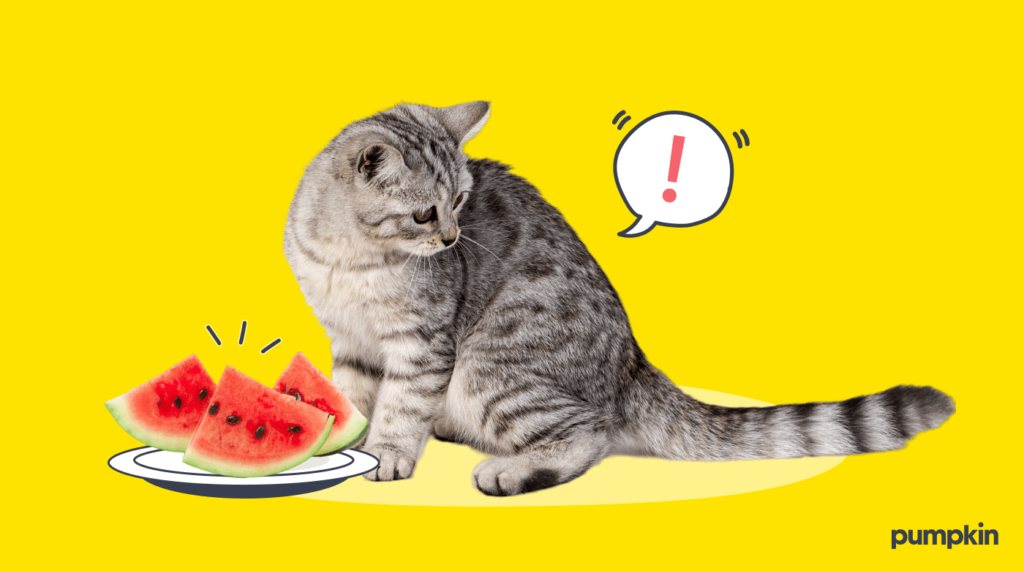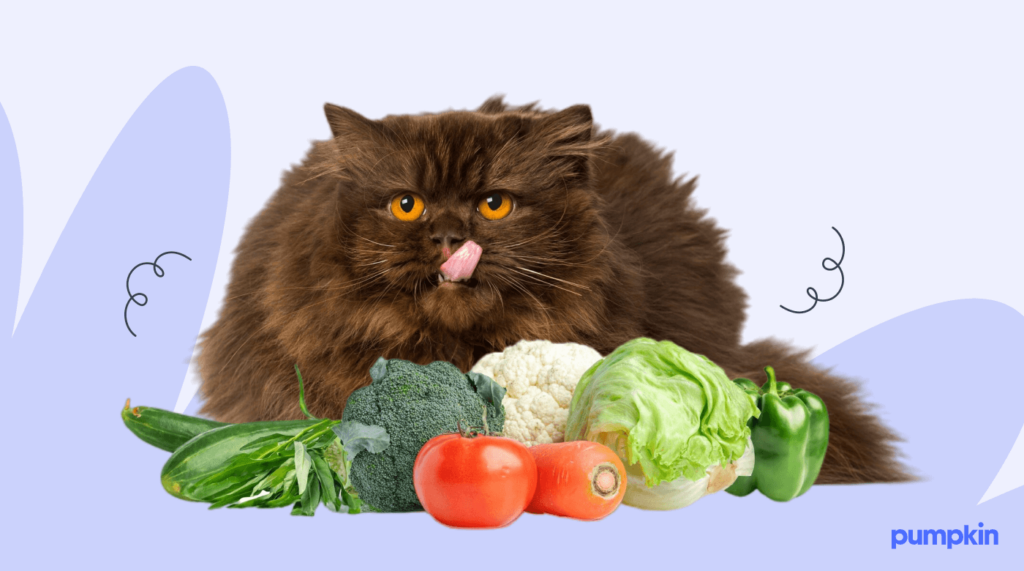Key Points
- Yes, cats can eat watermelon in moderation, but it’s not the best snack idea.
- Watermelon offers hydration, potassium, and vitamin C to humans, but carnivorous cats won’t get all the same benefits.
- Watermelon is also risky for cats with diabetes or obesity because of the sugar content.
Curious about sharing a juicy slice of watermelon with your cat on a hot summer day? Or maybe you’ve seen an adorable TikTok of a cat munching on watermelon and want to try it yourself?
Watermelon is a delicious and healthy snack for humans, rich in antioxidants, potassium, magnesium, and vitamins C, B6, and A. It’s also 92% water, making it a superb choice for hydration. But can cats eat watermelon?
Cats can have watermelon, but only as an occasional treat. While it might sound like a refreshing idea, this fruit isn’t a good snack option because of its sugar content, seeds, and cats’ dietary needs.
So, while this fruit isn’t toxic, other snacks offer more nutrition to cats.
Is watermelon healthy for cats?
Watermelon might offer some extra hydration, potassium, fiber, and vitamin C, but not enough to make an impact on a cat’s overall health. It’s not a super healthy food like it is for humans.
That’s because cats are obligate carnivores, meaning they rely solely on meat for their nutritional needs. They have very different dietary requirements to humans, as their bodies can’t digest all the carbohydrates and sugars found in human foods. Cats’ digestive systems simply aren’t made to digest plant material, including fruits and vegetables.
That means your cat won’t benefit much from the nutrients in watermelon and really doesn’t need them. Because of this, cat treats that provide nutrients appropriate for cats would be a better choice.
So, even if your cat has a sweet tooth and likes to nibble on watermelon, fruit shouldn’t be a regular part of their diet.
The risks of watermelon for cats
Serving watermelon to cats has several risks that you should be aware of as a pet owner.

Seeds and rind
First, watermelon seeds are very similar to apple seeds, which can cause intestinal blockages. They also contain cyanide, a toxic compound. A few seeds won’t do you any harm, but our cats have much smaller bodies, so they can become ill from the seeds.
Watermelon rind is another concern because most cats don’t chew their food. The rind is too hard for your cat to digest and could cause a choking hazard or blockages.
Sugar
Some cats might react negatively to the high sugar content in watermelon. Too much could cause gastrointestinal upset such as vomiting or diarrhea.
Cats with diabetes or obesity, in particular, should avoid watermelon as the high amounts of sugar and carbohydrates can make these conditions worse.
Allergies
In addition, some cats are allergic to watermelon. Watch out for signs of an allergic reaction such as itchy skin, bumps, rashes, sneezing, red eyes, and frequent bowel movements.
Alternatives to watermelon for cats
If watermelon isn’t right for your cat, many common foods are safe for cats to consume. Let’s look at some veggies, proteins, and other fruits your cat can try.

Vegetables
When it comes to human food, vegetables can be a nutritional and hydrating option for cats. For example, broccoli is rich in fiber and can help with constipation, while cooked carrots are good for cats’ vision, skin, and digestion. Other safe veggies for cats include asparagus, cucumbers, and peas. Just don’t be surprised if your cat takes no interest in these green vegetables. And unlike a picky eater of the human variety, there’s no need to force these veggies on your kitty.
Cooked salmon or chicken
Cooked salmon or chicken is another healthy option, and they are often found in commercial cat food. Always remove all bones beforehand. Again, as carnivores, your cat is more likely to appreciate a snack such as salmon or tuna. They may even prefer the salty taste of cheese to fruits and veggies.
Safer fruits
Pumpkin is a safe plant source, which can help overweight cats feel full without adding too many calories. You can also share blueberries, strawberries, and apples without seeds in moderation.
Still, avoid going overboard with human food — it shouldn’t be a huge part of your cat’s diet. Cat food is already specifically formulated for their needs.
Lastly, remember that many other human foods are off-limits. If you’re concerned about your cat’s nutritional needs, your vet can come up with a good plan to address them.
The verdict: Not toxic but not healthy either
Watermelon is safe to feed your cat, but it’s not the ideal treat, either. It has too much sugar and carbohydrates (which turn into more sugar during digestion). Most cats do very well on a regular feline diet designed to meet the dietary needs of an obligate carnivore.
And before you offer your cat a taste of any human food, make sure you double-check with your vet and consider a safety net. With pet insurance, you can be prepared for future accidents and illnesses. Learn more about Pumpkin pet insurance plans and how they can give cat parents peace of mind as your kitty grows.
FAQs
- https://www.livescience.com/46019-watermelon-nutrition.html
- https://www.vet.cornell.edu/departments-centers-and-institutes/cornell-feline-health-center/health-information/feline-health-topics/feeding-your-cat
- https://www.aspca.org/pet-care/animal-poison-control/people-foods-avoid-feeding-your-pets
- https://vcahospitals.com/know-your-pet/nutrition-feeding-guidelines-for-cats




